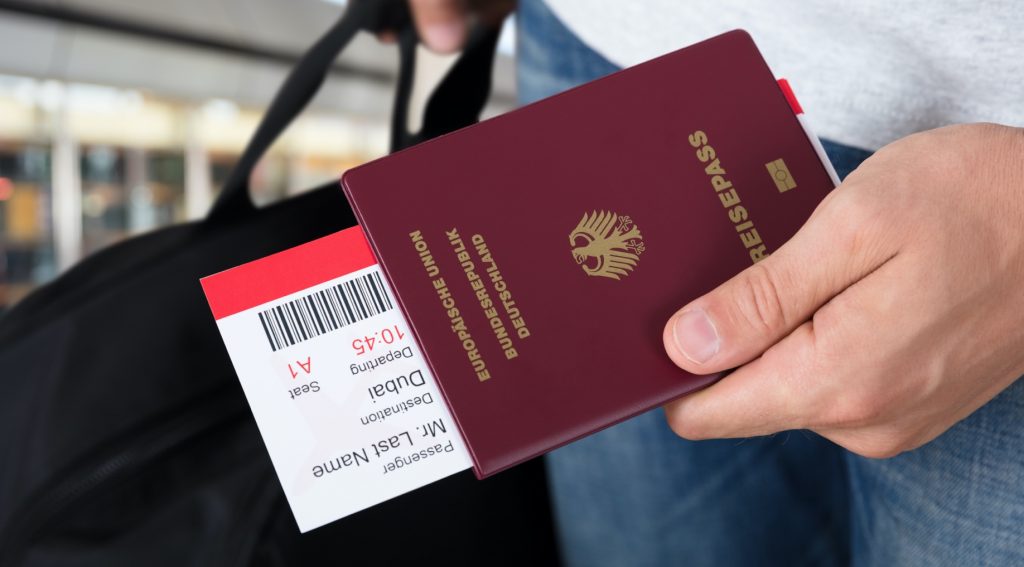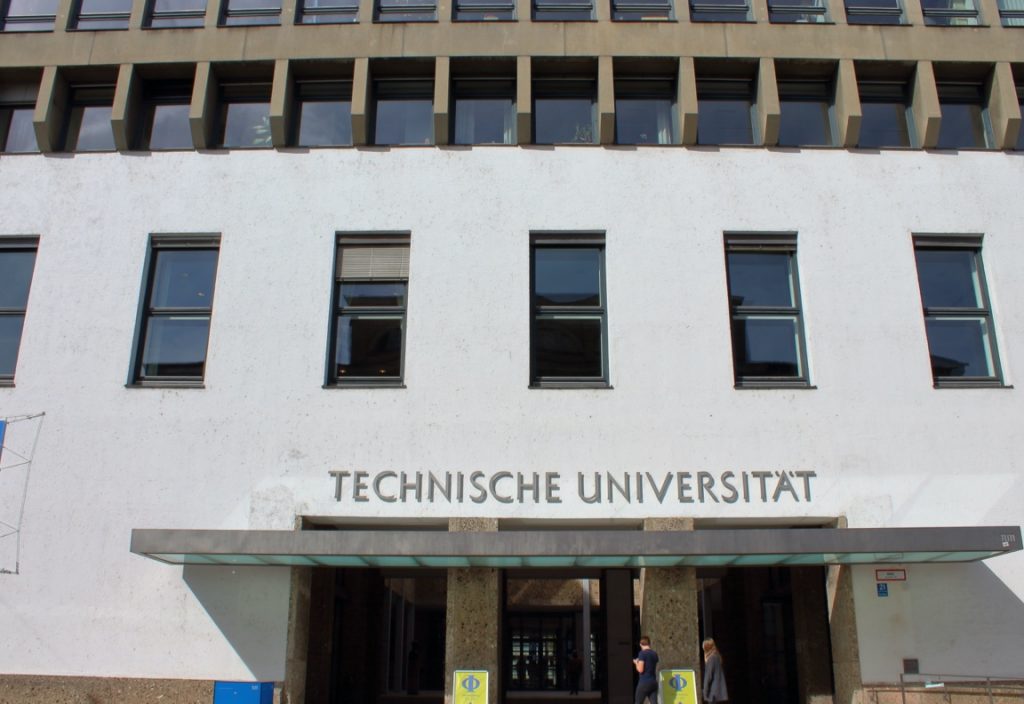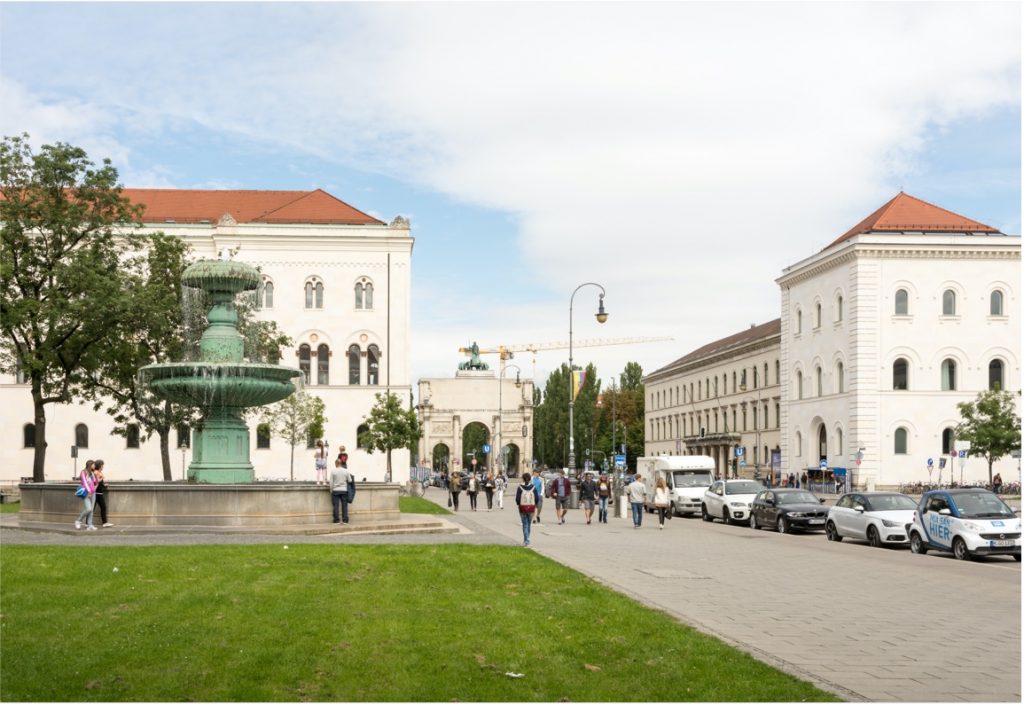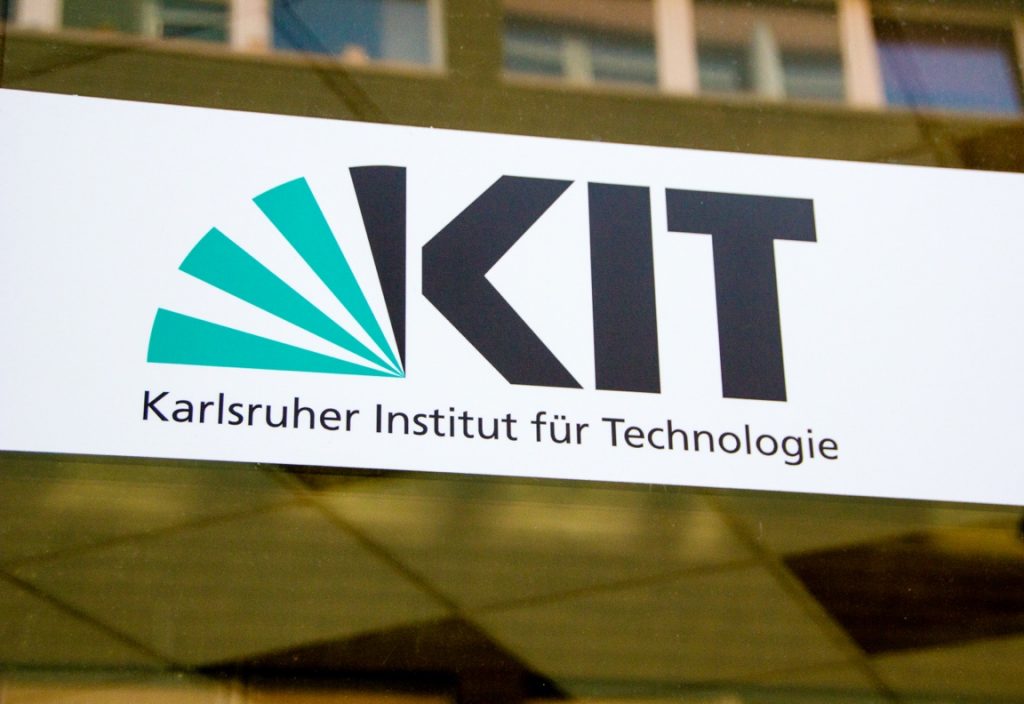Why study in Germany
Wondering why studying in Germany is best for you?
Germany is a country of principles, values, and ethos. Also, the culture of Germany is highly amiable for international students. For those who love nature, it is treat to watch flora and fauna there. Students love to wander, explore, and discover, 30% of Germany is embraced by forest and woodland.
A paradise for higher studies, Germany can boast of captivating scenery reminiscent of its true essence. Germany is the popular choice in Europe among students for higher education. And as a matter of fact, more than 3 lakh international students are currently enrolled in German universities.

Highly regarded universities
Universities in Germany enjoy a worldwide reputation and are known for their teaching and research excellence. In addition to the traditional top globally ranked universities, there are several other German universities that are introduced in global rankings every year. German universities are also among the oldest in Europe.
Countless courses to pick from
Germany is driven by innovation and technology, and to keep it going, universities there offer numerous courses to international students. There are more than 15,000 courses offered under various programs. From the atom to space education, wide field is open to the learner.
Courses in both English and German
International students get an option to pursue their courses in English or German. So, they don’t need to learn German to take admission in any of the reputed universities in Germany.
Numerous scholarships for Indian students
More than 20 DAAD offered scholarship programs are available for Indian students. For almost every field of education, you’ll find a scholarship to fund your stay and studies. By availing a scholarship, you can ease yourself from the burden of expenses.
Modern infrastructure and high standards
Though many of the top-ranked universities in Germany are decades old, the infra quality is top-notch and up to the global standards. For the very same reasons, international students praise the tech-enabled classrooms guided by the modern education infrastructure.
Affordable cost of living
On average, international students spend 700-800€ per month on rent, food, study material, leisure activity, internet, and phone. In Europe, this amount is supposed to be affordable for students, as they can work part-time and earn 10 to 15 Euros an hour to cover these costs of living in Germany. As of 2020, 853 euros a month are required to cover your living expenses in Germany. Your monthly rent is your largest expense in Germany.
World-renowned professors
Be it engineering, medical science, economics, or any other domain of education. Irrespective of it, the academic staff and professors provide students with high standards of knowledge that is up to date with the growing times.
Tuition-fee free education
11 out of 16 states have abolished tuition fees in more than 300 German public universities. International students either from E.U. or Non-E.U countries can avail this opportunity. However, they will have to submit semester fees, which cost around €150 and €350.
Work while you study
You are not allowed to be self-employed or pursue side income as a freelancer. As an international student from non-E.U countries, you can only work 120 full days or 240 half days per year. The average per hour wage for students ranges from 10 to 15 Euros. It implies that by working part-time, international students can efficiently cover up the monthly expenses.
Numerous job opportunities
Be it the German labor market or the global job market, your German university degree will be highly valued. Employers around the world trust the credits that you have earned after the completion of the course. And, for the same reason, international students often get multiple offers from top employers.

Germany Education System and Eligibility
Internationally known for Oktoberfest, automobile industry, architecture, football, and food, Germany is also one of the world’s best education provider countries. The education system there is guided by rules and regulations of the fundamental law “Grundgesetz.” In contrast to many other countries, Germany’s education system is sketched to provide students with the best at minimum cost. That’s why many of the public universities are either free of tuition fees or charge minimum fees.
Apart from this, the education system of Germany is mainly categorised into three institutions. So let’s learn about them and understand which one is best suited for your higher studies:

1. Vocational School and Technical Colleges
These institutions offer practical learning and training oriented courses to students. It includes language courses and diplomas that can be completed within a short time and prepares students to take admission in higher education or follow their career in the relevant work-field.
2. Universities
Also known as Universitäten, these educational institutions provide you with an array of undergraduate and postgraduate courses. Ideally, such universities mainly focus on theoretical knowledge and research so that students can get a better understanding of the subject.
There are more than 100 such universities in Germany, and most of the international students prefer them for higher studies. To take admission in such Universities, students may be expected to have a fluent command over the German language. Or, as an English speaking student, you can enroll yourself in the appropriate courses provided in English.
3. Universities of Applied Sciences
They are also referred to as Fachhochschulen and offer study programmes in engineering, business, social work, etc. These programmes are practice-oriented and are exclusively composed to provide students with the scientific knowledge of their respective fields. These courses involve practical semesters and take six, seven or eight semesters for completion.
International students can pursue both bachelor’s and master’s programs from Fachhochschulen, which are more than double the number of Universitäten.
4. Universities of Arts/Music
In Germany, these institutes are referred to as Kunst- und Musikhochschulen. The University of Arts and Music is best suited for students who wish to pursue an artistic career in fine arts, arts, and music, visual design, architecture, television, and media. Likewise, Universitäten, Universities of Arts/Music exercise practice-based teachings, and degrees obtained from these universities are equivalent to Universitäten.
To get listed in the arts and music university, students are expected to showcase their talent in the entrance exam. In case you prove to be above the mark, the qualification criteria will no longer be a subject of concern.
Moreover, all these institutions can be either state-run or private. While most of them are publicly financed, as many as 120 are private universities that come under Fachhochschulen. As these private institutes charge high tuition fees, maximum international students enroll themselves at tuition fee-free public universities.

Eligibility Criteria for International Students
Undoubtedly, many German public universities offer free education to international students. But, the eligibility criteria are fixed. All over Germany, these criteria are standard, and hence, as an international student, you’ll need to abide by them.
German universities look beyond academic performance while enrolling students. So, you’ll need to work on extracurricular activities as well and shall gather a broad understanding of the subject you wish to pursue in Germany. Some other factors determine your entrance in Germany universities, such as:
Along with this, International students might be asked to prove their English language proficiency if their medium of education wasn’t English. IELTS’s minimum score is expected to be 6.0, while for TOEFL, students are required to score at least 100.
Indian students who wish to pursue master’s courses in a public university must have at least 70-75%average aggregate from a reputable university. Besides, they will also have to take GRE with a minimum score of 300. However, on the other hand, private universities consider 50% average aggregate as the minimum criteria of admission for Indian students.
In case your home country education doesn’t match the criteria. Then you shouldn’t worry about the same as there is always an alternative to ensure your right to study in Germany. And, to get along, you might be required to pass an admission test or attend a foundation course known as Studienkolleg. This course prepares students for higher-degree programmes. You can only join a Studienkolleg foundation course after passing the Level B1 German language test and entrance examination.
After completing the foundation course, international students are required to take a higher education entrance examination. This test includes several subjects that are relevant to your area of interest in the study. Along with this, it’s mandatory to pass the language test.
Additional requirements
Language skills must are an important qualification for studying in Germany.
To earn your eligibility, you can take a test for international students (TestAs) at one of the international test centres. TestAs can guide you with your decision and also improve your chances of getting admission.
To get yourself enrolled in any of the course, you are required to fulfil the following criteria:
Upcoming Educational Fairs
Does the idea of meeting university representatives sound exciting to you? Yes, we care about your aspirations so you can now benefit from the comfort of your homes! Attend webinars, interact with industry experts, note points that’ll help you, and grab all the takeaways that you can. Over the next few months, we’ve organized several virtual webinars, discussions, and other informative events for you. Register for them and learn everything you need to, at your own pace.
- MO
- TU
- WE
- TH
- FR
- SA
- SU
- 1
- 2
- 3
- 4
- 5
- 6
- 7
- 8
- 9
- 10
- 11
- 12
- 13
- 14
- 15
- 16
- 17
- 18
- 19
- 20
- 21
- 22
- 23
- 24
- 25
- 26
- 27
- 28
- 29
- 30
- 1
- 2
- 3
- 4
- 5
Events for April
1
Events for April
2
Events for April
3
Events for April
4
Events for April
5
Events for April
6
Events for April
7
Events for April
8
Events for April
9
Events for April
10
Events for April
11
Events for April
12
Events for April
13
Events for April
14
Events for April
15
Events for April
16
Events for April
17
Events for April
18
Events for April
19
Events for April
20
Events for April
21
Events for April
22
Events for April
23
Events for April
24
Events for April
25
Events for April
26
Events for April
27
Events for April
28
Events for April
29
Events for April
30
German Student Visa
International students value Germany’s universities for their higher studies as there are numerous courses that give you multiple job opportunities. The number of students from all over the world is increasing every year to get educated in Germany. To be graduated in Germany, students from foreign countries need a German student visa. Also, students must obtain a Temporary residence permit after arriving in Germany within three months.

Types of student visa for study in Germany:
How to apply for a visa?
Right after getting a confirmation for studies from your chosen university, you should schedule an appointment with the nearby German Embassy. Also, before visiting the Embassy, review all the required documents such as Passport, original documents that are part of your visa application process. On the day of visa appointment, you’ll have to sit in an interview with a consular and answer the questions regarding your course, university, fees, living expenses, education in your home country and Germany, etc.
Cost of visa in Germany
International students need a National Visa to study in Germany. You can apply for this visa by the German embassy or in your home country by the consulate. The cost of German D-Visa for the students aged 18 and above is approx. €75. For the students of age under 18, it costs approx. €37.50. You are also required to get a residence permit, which comes with a validity of two years. If you are going to study in Germany for more than two years, you have to renew it according to your course duration.
For the residence permit, you have to prove to the visa officer that you are financially secure continuing the study. The amount for this is approx. €853 per month or approx. €10,356 for one year. This amount will be held in your blocked account. You can withdraw the money from this blocked account every month. Students who want to apply for residence permits also have to pay approx. €110.


Cost of living in Germany
Although Germany is a student-friendly country and provides free education, the standard of living is high, and living expenses are unavoidable. In comparison to some of the other European countries, Germany is pocket friendly for international students. The cost of living in Germany varies from place to place, and it largely depends on the course and city you have chosen for the education. For example, Munich is the most expensive city for you in comparison to other cities in Germany.
The cost of living covers the rent of accommodations, transport, food, and other basic needs necessary for you on a daily purpose. The basic average living cost for students in Germany is approx €850 per month.
Here is an approximate data from DAAD for different expenses calculated monthly.
Along with these expenses, you will need an amount for your entertainment too. Some places like Cologne, Berlin, The Romantic Road, Hamburg, The Mosel Valley, Regensburg, and others are the best places in Germany to visit. Most of the students choose to do full time or part-time jobs while pursuing their studies. You can either do a full-time job for 120 days or a part-time job of 240 days in a year.

Fees and scholarship
European countries are best known for higher education, but the cost of living and education fees is higher than in Asian countries. However, Germany, as a European country, offers education without any tuition fee in many of its public universities. Along with this, there are numerous scholarships for international students that can be availed to cover semester, stationary, transport, and accommodation expenses.
Most international students prefer to study in Germany for higher studies. Though the cost of education is relatively low or free, it’s recommended to accurately estimate other costs and ensure that you can pay them.
Eleven out of sixteen states have abolished college fees for both home and international students. Students will only need to pay semester fees, which costs around €150 and €350.

For a broad understanding of the fee structure, let’s learn about the different aspects:
Tuition fees
As state governments finance most universities, international students need not pay any fees for Bachelor or most of the Master’s courses. But if you choose to study from one of the private institutes, you are obliged to pay tuition fees. As state governments finance most universities, international students need not pay any fees for Bachelor or most of the Master’s courses. But if you choose to study from one of the private institutes, you are obliged to pay tuition fees.
Semester fees
Irrespective of your institution, it’s mandatory for students to pay semester fees. It generally ranges from 100 to 350 Euros and shall be submitted when you enroll and before the start of every new semester.
Scholarship opportunities for International students
After you are done with the estimated cost of studying in Germany, it’s right to plan your funds. One of the best ways to do so is to qualify yourself for one of the scholarships. DAAD and many other business-affiliated institutes offer scholarships to students. The scholarship usually consists of the monthly payment of € 750 for undergraduates, € 850 for graduates, and € 1200 for PhD students. DAAD also provides health, accident, and personal liability insurance to international students.
Undergraduate courses in Germany
Getting started with a graduate course in Germany offers you excellent prospects. By enrolling in a suitable study program, you can learn the very basics of the subject. It will eventually benefit you while pursuing further education or landing a decent job in the international market.
Universities of Germany provide a range of the best courses for graduation to international students. Bachelor’s degree usually comes with the standard period of three years in which you have to cover six semesters with 180 ECTS. German Universities offer degrees like Bachelor of Arts, Bachelor of Engineering, Bachelor of Science, Bachelor of Fine Arts, and Bachelor of Music. If you intend to study abroad in Germany, here is the list of some demanding graduate courses that will help you to master your expertise and grab the best job opportunities

Getting started with a graduate course in Germany offers you excellent prospects. By enrolling in a suitable study program, you can learn the very basics of the subject. It will eventually benefit you while pursuing further education or landing a decent job in the international market.
Universities of Germany provide a range of the best courses for graduation to international students. Bachelor’s degree usually comes with the standard period of three years in which you have to cover six semesters with 180 ECTS. German Universities offer degrees like Bachelor of Arts, Bachelor of Engineering, Bachelor of Science, Bachelor of Fine Arts, and Bachelor of Music. If you intend to study abroad in Germany, here is the list of some demanding graduate courses that will help you to master your expertise and grab the best job opportunities.
There are some other degrees too, which offer the students immense career opportunities such as Teaching degree, Art, Music, Design, and Language and Cultural Studies.
Post Graduate courses in Germany
If you want a successful career right after completing your studies, then German Universities can help you. Postgraduate courses in German Universities provide many job possibilities with their effective teaching and training techniques. Masters degree usually comes with the standard period of two years in which you have to cover four semesters with 120 ECTS.
Most universities offer a degree in Master of Arts, Master of Engineering, Master of Science, Master of Fine Arts, Master of Corporate Management, and Master of Music. The research facilities, standardized education system, and excellent German university infrastructure attract many students worldwide. Here is a list of postgraduate courses that you can study in Germany and boost your career possibilities:

Mathematics and Computer Science
Post Graduation in German universities with Mathematics and Computer Science gives you the scope of highly paid jobs. You will get individual counselling and academic guidance, which will help you develop the required skills.
Medicine and Dentistry
German universities provide you with both practical and theoretical principles of treatment and diagnosis in the field of Medicine and Dentistry. It includes dental prosthetics, restorative dentistry, jaw, and maxillofacial surgery, and orthodontics. After clearing the state examination, you will get a license to practice dentistry or work as a trainer in any institute.
Law
In Germany, you have to clear two-state exams within six years of the course of Law. The first exam will be at the end of four years, which comes under the graduation course, and the second exam will be after finishing the criminal and civil court legal internships that come in the post-graduation course. There is a good chance for international students to find employment and a high salary right after completing the law degree.
Engineering
German universities provide a global study environment to the students in the field of Engineering. You can choose one specific subject for your study from different engineering degrees like Mechanical, Electrical, Biomedical, or space engineering. You will study under the guidance of experienced professors with high academic standards, which help in your self-development. After completing this post-graduation course in Germany, you can get a well-paid job in Germany or another country.
Business and Economics
This course has a great scope of job opportunities in and out of Germany. You will learn successful business strategies throughout the course. You will be able to select appropriate performance measures to maintain and build-up the human capital in the firm’s needs.
Apart from these, some other significant postgraduate courses in Germany are most pursued by international students; it includes Natural Science, Architecture, Arts and Design.
Top Universities in Germany
Germany is home to the best universities after the U.K. and U.S. Most of the well-known higher education institutes are public, while less than 10% are private universities. International students can apply to only the German government approved education provider, which can be both public or private. Here is the list of some Top universities in Germany admired by the international students.
Technical University of Munich
The Technical University of Munich, with 50 world Q.S. ranking, is one of Europe's finest universities in provisions of research, technology, and innovation. It is focused on the different fields of courses like engineering, medicine, natural sciences, and social sciences.
Ludwig-Maximilians-Universität München
Ludwig-Maximilians-Universität München or the Ludwig Maximilian University of Munich is one of the leading research universities in Europe. It is the sixth oldest university in Germany, which is continuously ranking among the best. This university is ranked 63 on world Q.S. ranking and known for its excellence in research and teaching in different fields like Natural science, Humanities, Law, Economics, Medicine, and Cultural studies.
Ruprecht-Karls-Universität Heidelberg
The Heidelberg University, also known as Ruprecht-Karls-Universität Heidelberg, is one of the world's oldest surviving universities. It is the public research university in Germany and is ranked 64 on world Q.S. ranking and popular among the international students. It is focused on different fields of courses like Ancient History, Computer Science, Economics, Education Studies, International Law, Healthcare, and many other subjects that are in demand at present.
KIT, Karlsruhe Institute of Technology
Karlsruhe Institute of Technology is the most notable institute of engineering and technology, Ranked 131 on world Q.S. ranking, it is part of the TU9 German institute of technology, representing the largest and prestigious universities in Germany that are distributed in several locations. Engineering, Hotel Management, Art and design, and other courses with the reputed academic culture abstract the international students.
Humboldt-Universität Zu Berlin
Humboldt-Universität Zu Berlin is one of the reputed universities in Germany which provides counselling services, excellent information, and job or internship opportunities to the students. It is ranked 117 on the world Q.S. ranking.
Heidelberg University
Being a city of historic values, Heidelberg has its own public university. Founded in 1386, Heidelberg University is the oldest university in Germany. Due to its globally recognized stature, international students constitute a large part in the field of research related courses. According to the latest Times Higher Education rankings of 2021, Heidelberg University ranks as among the top 3 institutions in Germany. There are many other renowned universities in Germany that offer exceptional education to international students. Including some private universities, such as Berlin School of Business and Innovation, Gustav Siewerth Academy, Deutsche Journalistenschule, International Psychoanalytic University Berlin, SRH Hochschule Berlin, etc.
International students may also consider some private universities, such as Berlin School of Business and Innovation, Gustav Siewerth Academy, Deutsche Journalistenschule, International Psychoanalytic University Berlin, SRH Hochschule Berlin, etc.
Intakes & deadlines for 2020
As the visa process usually can take about nine months, an early application is recommended for international students. The intake time for all German universities starts in September, and deadlines till May. Besides, some universities offer admission in March, and deadlines are usually from November till January.

There are two ways that international students can submit their application. Either you can apply on your own or take assistance from UNI ASSIST. It is a government body that processes your application to universities. Usually, they charge 55 Euros while applying for 2-3 universities and an additional 15 Euros per university.
Once you apply, it takes around 3-4 months for universities to inform students about their selection. So, you should submit all the required details in the application along with the needed documents.
Student Visa Checklist for Germany
Many international students wish to study abroad in Germany. If you want to graduate from there, you have to apply for a National visa for long term courses under German D-Visa. It is mandatory to apply for the visa before three months of your intended departure. To apply for the student visa, you have to follow a thorough process and complete the Student visa checklist formalities for Germany. You have to keep all the needed documents that assure your visa eligibility.
Here is the list of all required documents for the students while applying for the German visa:

- Confirmation letter of admission from the authorised university of Germany
- Valid passport
- Certificates of English Language Proficiency
- Health insurance
- Proof of financial security
- Proof of earlier education
Confirmation letter of admission from the authorised university of Germany
The university where you are applying for the study will provide a letter of confirmation of your admission after you get enrolled in it, which you have to present to the German visa embassy office.
Valid passport
While applying for the German student visa, you have to bring a passport, which must be issued within ten years of your application for the visa registration. Your passport must have at least 12 months of extended validity after your return.
Certificates of English Language Proficiency
Language competence proofs are must while applying for a German visa. Students. If the student pursued earlier education from an English school, then they can directly take admission in courses taught in the English language. Apart from this, students can also submit IELTS score, Cambridge English Certificate, TOEFL scores.
Health insurance
Proof of health insurance sum insured of euro 30000 minimum is required for the students to get a study visa for Germany.
Proof of financial security
You have to prove that you are financially secure to pay study fees in Germany and meet other essential expense to live international students, require to present blocked accounts in which an amount of approx. €10,356 is kept by visa officers for one year to make sure that students can sustain Germany’s lifestyle.
Proof of earlier education
While applying for the German student visa, you must have to keep your earlier education documents along with the original school leaving certificate, which shows that you are eligible for the applied course in the German University.
There are some other things, too, which are essential in the Student visa checklist for Germany. Like a correctly filled application form, copy of your passport in A4 format, passport size photographs, a cover letter with the explanation of your purpose to visiting in Germany, and the university’s fees if applicable.
Study Visa Process
As an international student, you can directly apply for a German Study Visa once you get a Letter of Acceptance from a university. In case, if you are awaiting the response from the university, or called for an entrance exam, you can apply for a Prospective Visa. It is generally valid for three months but can be extended by 6-months when you get a letter of acceptance or take admission for foundation course or German language course.
It’s advised to apply early for a student visa as sometimes it can take months to process visa applications. Even if you haven’t received a letter of acceptance, you can apply for a Prospective Visa and later convert it into residence permit once you arrive in Germany.

Types of German Student Visa and Requirements
Mainly there are three different visas that international students can acquire for education purposes. They are: a language course visa, student visa, and student application visa. Depending on the course, you will have to apply for one of them. All these visas are valid for three months. Within this duration, students shall apply for a resident permit. Below we have explained individual visas and their specific requirements, while the general requirements are:
Language course visa
This visa is most suitable for international students who are willing to pursue an intensive language course from Germany. Language visa costs €60 and validity lasts as per the course duration. However, it can be extended by up to 12 months, only when you are not enrolling for higher studies. In this case, you will have to return to your home country and apply for a German student visa.
Additional Documents Required for Language Course Visa
Student visa
This visa is recommended to international students who have applied for a state-approved university course and have been provided with a confirmation for the same either via a letter of acceptance or confirmation of application. A student visa can also be availed to comply with the admission process that may include examination, interview, etc.
Additional Documents Required for Student Visa
Student applicant visa
If your course is due to start within three months and you haven’t received an admission letter, then it’s recommended for students to apply for a student application visa. Or, if you have been called for an examination for entrance, then you shall apply for a student applicant visa. It’s valid for three months but can be extended to six months when required
Study visa interview tips
How to Apply for German Student Visa?
International students are expected to apply for a German student visa from the nearby German Embassy or Consulate. In addition, they will have to get an appointment for a visa interview with a consular official and follow the procedures of application, take an interview for the same.
How to Prepare for German Visa Interview?
Once you are done with all the requirements, a visa interview is the last step in getting a German visa. Therefore students should prepare well, attend the interview with all the required documents and answer the questions truthfully. Any falsification in the application or interview can lead to the rejection of your visa application.

Frequently asked German Visa Interview Questions
Note that, these are some of the most asked questions and it’s not necessary that you’ll be asked the same ones. It depends on the consular officer and visa application, On the basis of your responses an officer can also ask further questions to ascertain your claims. Hence, while attending a visa interview, you should consider answering the questions thoroughly. In addition, while attending a visa interview, students should stay polite and reflect good body language and behavior.
Speak to Our Counselors
We at Chetanya, are recognized as India’s leading IELTS and Visa company. Our experts have guided and trained more than 50,000 students and provided them with the best study abroad opportunities.
We believe that with proper counselling, students can show their caliber and make study in Germany a reality. At any moment, if you require assistance, feel free to get in touch with our experts. They will recommend the best universities in Germany in line with your preferences.
Students can also as question about accommodation, cost of living, admission procedure, and eligibility. Our expert counsellors will be glad to clear your doubts.










